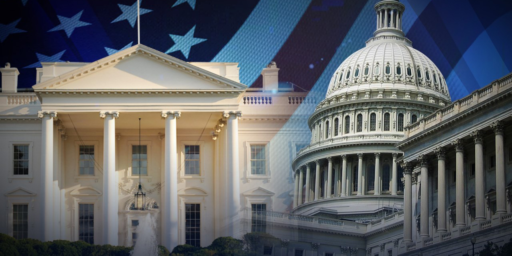D.C. Circuit Recognizes Bloggers as Journalists
Orin Kerr read through the ruling that Judith Miller and Matthew Cooper have no First Amendment right not to testify in the Plame investigation and finds this nugget:
Nor does it matter that unconventional forms of journalism—freelance writers and internet “bloggers,” for example—may raise definitional conundrums down the road. See sep. op. at 5-9 (Sentelle, J., concurring); but see Eugene Volokh, Opinion, You Can Blog, But You Can’t Hide, N.Y. Times, Dec. 2, 2004, at A39 (“[T]he rules should be the same for old media and new, professional and amateur. Any journalist’s privilege should extend to every journalist.”). As Jaffee makes clear, “[a] rule,” such as Rule 501, “that authorizes the recognition of new privileges on a case-by-case basis makes it appropriate to define the details of new privileges in a like manner.” 518 U.S. at 18. After all, “flexibility and capacity for growth and adaptation is the peculiar boast and excellence of the common law.” Hurtado v. California, 110 U.S. 516, 530 (1884). Here, whereas any meaningful reporter privilege must undoubtedly encompass appellants Cooper and Miller, full-time journalists for Time magazine and the New York Times, respectively, future opinions can elaborate more refined contours of the privilege—a task shown to be manageable by the experience of the fifty jurisdictions with statutory or common law protections.
So, we have a blogger citing another blogger citing a judge citing other judges plus an op-ed written by a lawyer-blogger in the NYT. Definitional conundrums, indeed.






Hey
this crowd recognizes spys, propagandists, and so called journalists leaking the names of undercover CIA agents to the mas media, with bush approval,
Rapture happened in 1939 and they are still here!
Dr. Joyner, your headline’s a bit of an overstatement.
Judge Sentelle’s opinion for the three-judge panel — the only part of today’s decision that can be attributed to the DC Circuit as a whole — doesn’t mention bloggers.
The debate between Judge Sentelle and Judge Tatel in their separate concurring opinions, as quoted by Orin Kerr, represents only the dicta of two judges debating a hypothetical case not before them. Nothing either said in those concurring opinions can fairly be characterized as a “holding” of the DC Circuit, nor does it have any binding precedential effect on any court (although it might be read, and perhaps found persuasive, or not, by other courts).
Judge Sentelle objected to creating a qualified common-law (non-First Amendment, non-constitutional) privilege for journalists to refuse to testify about confidential sources in part because he anticipates difficulties in defining who qualifies as “journalists” entitled to invoke that privilege. As he points out, it takes about 3 minutes to create a blog.
Judge Tatel appears to leave open the possibility that some — but not necessarily all — bloggers might qualify for the (new) federal common-law privilege he wants to create, but suggests that would be worked out in the future on a case-by-case basis. As in, your blog and InstaPundit might make you and Prof. Reynolds “journalists,” whereas my humble blog might not make me one; we’d none of us know unless and until we tried to fight a grand jury subpoena.
My very extended take (via an overextended football metaphor, of all things) on today’s DC Circuit opinion is here, but it doesn’t really focus much on the blogger-as-journalist hypothetical.